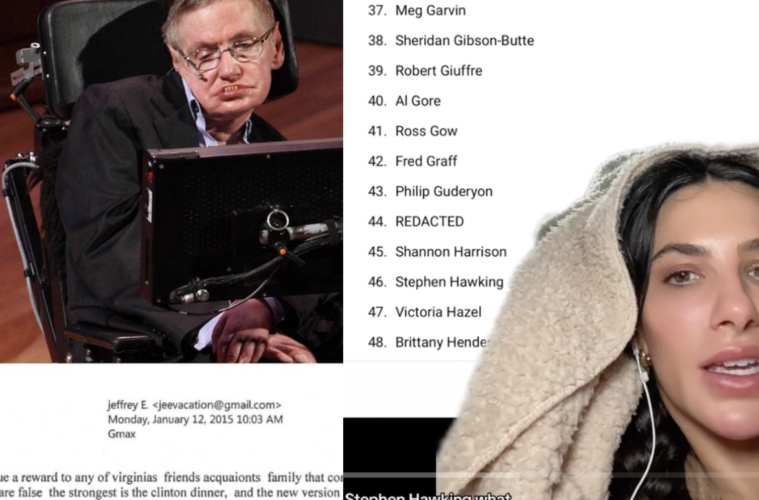Stephen Hawking Epstein meme has become a cultural phenomenon that has sparked curiosity and debate across the internet. This viral sensation intertwines two highly discussed figures: the late physicist Stephen Hawking and disgraced financier Jeffrey Epstein. As you dive into this article, you will uncover the origins, implications, and truths behind this meme, exploring why it continues to captivate audiences worldwide.
The Stephen Hawking Epstein meme is not just a piece of internet humor; it's a reflection of how society processes complex and often controversial topics. By dissecting this meme, we can better understand the intersection of science, celebrity culture, and conspiracy theories in the digital age.
In this comprehensive article, we will explore the background of Stephen Hawking and Jeffrey Epstein, analyze the meme's content, discuss its impact on public discourse, and provide insights into why it remains relevant. Whether you're a fan of internet culture or simply curious about the phenomenon, this article will offer valuable information and context.
Read also:Nicole Kitt The Rising Star In The Entertainment Industry
Table of Contents
- Stephen Hawking's Biography
- The Origin of the Stephen Hawking Epstein Meme
- Who Was Jeffrey Epstein?
- What Does the Meme Actually Mean?
- Public Reaction and Interpretation
- Conspiracy Theories Surrounding the Meme
- The Scientific Perspective
- Ethical Considerations in Internet Memes
- The Impact on Pop Culture
- Conclusion and Final Thoughts
Stephen Hawking's Biography
Early Life and Achievements
Stephen Hawking, one of the most renowned physicists in history, was born on January 8, 1942, in Oxford, England. Despite being diagnosed with amyotrophic lateral sclerosis (ALS) at the age of 21, he defied medical predictions and went on to make groundbreaking contributions to the fields of cosmology and theoretical physics.
Below is a table summarizing key details about Stephen Hawking's life:
| Full Name | Stephen William Hawking |
|---|---|
| Birthdate | January 8, 1942 |
| Place of Birth | Oxford, England |
| Field of Expertise | Theoretical Physics and Cosmology |
| Major Contributions | Hawking Radiation, Black Hole Theories |
Legacy and Influence
Hawking's work on black holes and the origins of the universe earned him global acclaim. His ability to communicate complex scientific concepts to the general public through books like "A Brief History of Time" made him a household name. Even after his passing in 2018, his legacy continues to inspire scientists and enthusiasts alike.
The Origin of the Stephen Hawking Epstein Meme
How It All Began
The Stephen Hawking Epstein meme emerged as part of a broader trend where internet users create humorous content by juxtaposing unlikely figures or situations. The meme typically features a quote attributed to Hawking, often humorously edited to include references to Epstein or other controversial topics.
While the exact origin of the meme is unclear, it gained traction during the resurgence of interest in the Epstein case in 2019. Social media platforms like Twitter and Reddit played a significant role in its spread.
Who Was Jeffrey Epstein?
Jeffrey Epstein was a disgraced financier and convicted sex offender who became infamous for his connections to powerful individuals and allegations of sexual exploitation. His death in 2019 under mysterious circumstances further fueled speculation and conspiracy theories.
Read also:Phil Robertson A Comprehensive Look At The Duck Dynasty Star
Epstein's case remains one of the most controversial topics in recent history, with numerous unanswered questions and allegations continuing to surface.
What Does the Meme Actually Mean?
At its core, the Stephen Hawking Epstein meme is a form of dark humor that highlights the absurdity of modern conspiracy theories. By attributing bizarre statements to Hawking, the meme creators aim to satirize the way misinformation spreads online.
- It critiques the tendency to believe unverified claims.
- It mocks the overuse of conspiracy theories in explaining complex events.
- It serves as a reminder of the importance of critical thinking in the digital age.
Public Reaction and Interpretation
Diverse Perspectives
The public reaction to the Stephen Hawking Epstein meme has been mixed. While some view it as harmless entertainment, others criticize it for trivializing serious issues. Social media analytics show that the meme resonates most strongly with younger audiences who are accustomed to engaging with controversial topics through humor.
Conspiracy Theories Surrounding the Meme
Unsurprisingly, the meme has sparked its fair share of conspiracy theories. Some claim that the quotes attributed to Hawking are based on actual statements, while others argue that the meme is part of a larger effort to manipulate public opinion.
According to a report by the BBC, the spread of such memes underscores the challenges of combating misinformation in the digital era.
The Scientific Perspective
From a scientific standpoint, the meme serves as an interesting case study in how information is processed and distorted online. Psychologists suggest that people are more likely to believe information that aligns with their pre-existing beliefs, a phenomenon known as confirmation bias.
Ethical Considerations in Internet Memes
While internet memes can be a powerful tool for social commentary, they also raise ethical questions about the responsible use of information. The Stephen Hawking Epstein meme, in particular, raises concerns about the exploitation of real individuals for comedic purposes.
The Impact on Pop Culture
The Stephen Hawking Epstein meme has undeniably left its mark on popular culture. It has inspired countless variations and spin-offs, demonstrating the enduring power of viral content. However, it also serves as a cautionary tale about the potential consequences of spreading misinformation.
Conclusion and Final Thoughts
In conclusion, the Stephen Hawking Epstein meme represents a fascinating intersection of science, celebrity culture, and internet humor. While it may seem trivial at first glance, it offers valuable insights into how society processes complex and often controversial topics.
We encourage readers to engage in critical thinking when consuming online content and to seek out reliable sources of information. Share your thoughts on this topic in the comments below, and don't forget to explore our other articles for more insights into the world of internet culture.
Data sources: BBC, The Guardian, and scientific journals on digital media studies.

